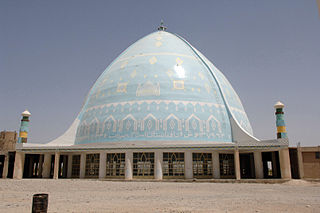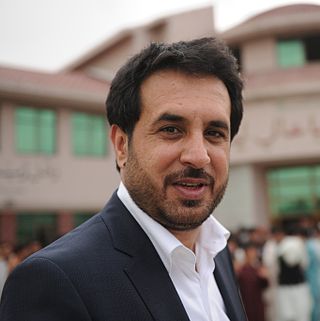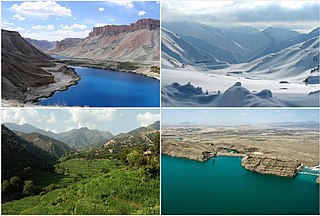
Afghanistan, officially the Islamic Emirate of Afghanistan, is a landlocked country located at the crossroads of Central Asia and South Asia. Referred to as the Heart of Asia, it is bordered by Pakistan to the east and south, Iran to the west, Turkmenistan to the northwest, Uzbekistan to the north, Tajikistan to the northeast, and China to the northeast and east. Occupying 652,864 square kilometers (252,072 sq mi) of land, the country is predominantly mountainous with plains in the north and the southwest, which are separated by the Hindu Kush mountain range. Kabul is the country's largest city and serves as its capital. According to the World Population review, as of 2021, Afghanistan's population is 40.2 million The National Statistics Information Authority of Afghanistan estimated the population to be 32.9 million as of 2020.

Mohammad Ismail Khan is an Afghan former politician who served as Minister of Energy and Water from 2005 to 2013 and before that served as the governor of Herat Province. Originally a captain in the national army, he is widely known as a former warlord as he controlled a large mujahideen force, mainly his fellow Tajiks from western Afghanistan, during the Soviet–Afghan War.

Kandahar is a city in Afghanistan, located in the south of the country on the Arghandab River, at an elevation of 1,010 m (3,310 ft). It is Afghanistan's second largest city after Kabul, with a population of about 614,118. It is the capital of Kandahar Province and the centre of the larger cultural region called Loy Kandahar. Kandahar is the founding city and spiritual center of the Taliban. Despite the capital of Afghanistan being Kabul, where the government administration is based, Kandahar is the seat of power in Afghanistan as the supreme leader and his spiritual advisers are based there. Kandahar has therefore been called the de facto capital of Afghanistan, though the Taliban maintain Kabul is the capital.

The Taliban, which also refers to itself by its state name, the Islamic Emirate of Afghanistan, is a militant Pashtun nationalist organization in Afghanistan with close ties to Deobandi Islamic fundamentalism. It ruled approximately three-quarters of the country from 1996 to 2001, before being overthrown following the American invasion. It recaptured Kabul on 15 August 2021 following the departure of most coalition forces, after nearly 20 years of insurgency, and currently controls all of the country. However, its government is not recognized by any country. The Taliban government has been internationally condemned for restricting human rights in Afghanistan, including the right of women and girls to work and to have an education.

Hamid Karzai is an Afghan politician who served as the fourth president of Afghanistan from July 2002 to September 2014, including as the first elected president of the Islamic Republic of Afghanistan from December 2004 to September 2014. He previously served as Chairman of the Afghan Interim Administration from December 2001 to July 2002. He is the chief (khān) of the Popalzai Durrani tribe of Pashtuns in Kandahar Province.

The Taliban insurgency began after the group's fall from power during the 2001 War in Afghanistan. The Taliban forces fought against the Afghan government, led by President Hamid Karzai, and later by President Ashraf Ghani, and against a US-led coalition of forces that has included all members of NATO; the 2021 Taliban offensive resulted in the collapse of the government of Ashraf Ghani. The private sector in Pakistan extends financial aid to the Taliban, contributing to their financial sustenance.

Asadullah Khalid is a politician in Afghanistan. He served as head of the National Directorate of Security (NDS), which is the domestic intelligence agency of Afghanistan. Before his appointment as the head of the NDS in September 2012, Khalid served as the Minister of Tribal and Border Affairs. Between 2005 and 2008, he was the Governor of Kandahar Province and prior to that as Governor of Ghazni Province (2002-2005). From 2018 until 2021 he was the Minister of Defense. Khalid is said to be affiliated with the Islamic Dawah Organisation of Afghanistan and has been noted as one of many loyalists of Afghan President Hamid Karzai.
The following lists events that happened during 2004 in Afghanistan.
Kidnapping and hostage taking has become a common occurrence in Afghanistan following the U.S. invasion of Afghanistan in 2001. Kidnappers include Taliban and Al-Qaeda fighters and common criminal elements.
The mass media in Afghanistan is monitored by the Ministry of Information and Culture (MoIC), and includes broadcasting, digital and printing. It is mainly in Dari and Pashto, the official languages of the nation. It was reported in 2019 that Afghanistan had over 107 TV stations and 284 radio stations, including 100s of print media and over 1,800 online media outlets. After the return of the Islamic Emirate of Afghanistan (IEA) in 2021, there was a concern that the mass media will significantly decrease in the country. The number of digital media outlets is steadily increasing with the help of Facebook, Instagram, TikTok, Twitter, YouTube, and other such online platforms. IEA's spokesman Zabihullah Mujahid suggested that the media should be in line with Sharia and national interests.

Zabihullah Mujahid is an Afghan official serving as the chief spokesman for the Islamic Emirate of Afghanistan (Taliban) since 25 October 2021 and Deputy Minister of Information and Culture since 7 September 2021. He has long served as one of several spokesmen for the Taliban, the others being Suhail Shaheen and Yousef Ahmadi. Mujahid commented mainly on the Taliban's activities in eastern, northern, and central Afghanistan, while Ahmadi focused on the western and southern regions. In addition to being the government's main spokesman, Mujahid serves as a personal spokesman for Supreme Leader Hibatullah Akhundzada.

Abdullah Abdullah is an Afghan politician who led the High Council for National Reconciliation (HCNR) from May 2020 until August 2021, when the Afghan government was overthrown by the Taliban. The council had been established to facilitate peace talks between the Islamic Republic of Afghanistan and the Taliban insurgents. Abdullah served as the Chief Executive of Afghanistan from September 2014 to March 2020, and as Minister of Foreign Affairs from December 2001 to April 2005. Prior to that, he was a senior member of the Northern Alliance, working as an adviser to Ahmad Shah Massoud. He worked as an ophthalmologist and medical doctor in the 1980s.

Tourism in Afghanistan is regulated by the Ministry of Information and Culture. There are at least 350 tourism companies operating in Afghanistan. Tourism was at its peak before the 1978 Saur Revolution, which was followed by the decades of war. Between 2013 and 2016, Afghan embassies issued between 15,000 and 20,000 tourist visas annually.
2003 in Afghanistan. A list of notable incidents in Afghanistan during 2003

Mullah Hibatullah Akhundzada, also spelled Haibatullah Akhunzada, is an Afghan Deobandi Islamic scholar, cleric, and jurist who is the supreme leader of Afghanistan. He has led the Taliban since 2016, and came to power with its victory over U.S.-backed forces in the 2001–2021 war. A highly reclusive figure, he has almost no digital footprint except for an unverified photograph and several audio recordings of speeches.

The Islamic State–Taliban conflict is an ongoing armed conflict between the Islamic State and the Taliban in Afghanistan. The conflict escalated when militants who were affiliated with Islamic State – Khorasan Province killed Abdul Ghani, a senior Taliban commander in Logar province on 2 February 2015. Since then, the Taliban and IS-KP have engaged in clashes over the control of territory, mostly in eastern Afghanistan, but clashes have also occurred between the Taliban and IS-KP cells which are located in the north-west and south-west.
2021 (MMXXI) was a common year starting on Friday of the Gregorian calendar, the 2021st year of the Common Era (CE) and Anno Domini (AD) designations, the 21st year of the 3rd millennium and the 21st century, and the 2nd year of the 2020s decade.

A military offensive by the Taliban insurgent group and allied militants led to the fall of the Kabul-based Islamic Republic of Afghanistan and the end of the nearly 20-year War in Afghanistan that had begun following the United States invasion of the country. The Taliban victory had widespread domestic and international ramifications regarding human rights and proliferation of terrorism. The offensive included a continuation of the bottom-up succession of negotiated or paid surrenders to the Taliban from the village level upwards that started following the February 2020 US–Taliban deal.
The politics of Afghanistan are based on a totalitarian emirate within the Islamic theocracy in which the Taliban Movement holds a monopoly on power. Dissent is not permitted, and politics are mostly limited to internal Taliban policy debates and power struggles. As the government is provisional, there is no constitution or other basis for the rule of law. The structure is autocratic, with all power concentrated in the hands of the supreme leader and his clerical advisors.










